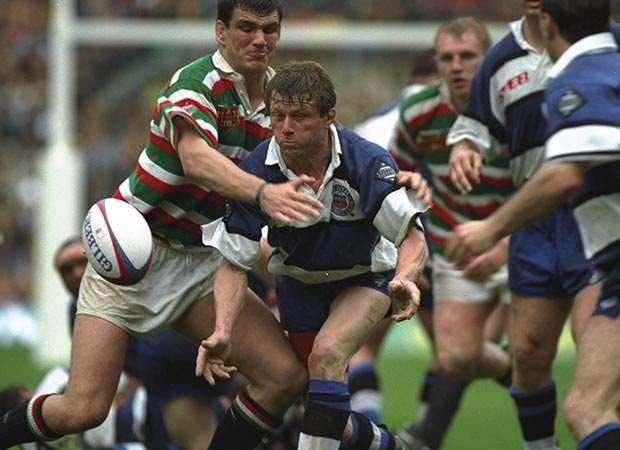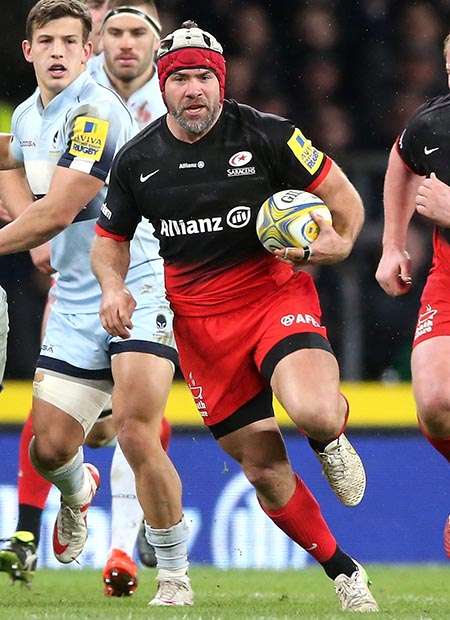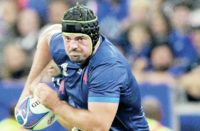 Graham Dawe was the incarnation of uncompromising. That is one of the reasons why Eddie Jones invited the grizzled former Bath and England hooker, who is
Graham Dawe was the incarnation of uncompromising. That is one of the reasons why Eddie Jones invited the grizzled former Bath and England hooker, who is
synonymous with the club's glory days in the 1980s-90s, down to Pennyhill Park to hold a couple of tutorials last week. Jones feels that England's forwards have become too nice, and need reacquainting with a harder edged outlook. Enter Dawe, who's attitude could have been the model for Tom Petty's anthem to heart-of-oak defiance, I Won't Back Down.
As Jones discovered when he played hooker for New South Wales against England on their 1988 tour Down Under if anyone tried to stand Dawe up against the gates of hell as the song says, the wiry farmer from the Devon-Cornwall border would come out fighting.
Dawe's England career hit difficulties when he was one of the players banned by the RFU after the bar-room brawl in the ugly Wales v England clash in Cardiff in the 1987 Five Nations, with the English Union, in my view, too ready to put a disproportionate amount of the blame on their own forwards.
My abiding memory, however, is that when the going got tough, as it did against a thuggish Eastern Province pack on England's 1994 tour of South Africa, Dawe was not just the point of resistance in Port Elizabeth but a one-man commando. By the end of a brutal match in which Tim Rodber was sent off for fighting and Dawe's Bath team-mate Jon Callard had his face opened up by the studs of a Springbok forward, requiring 25 stitches, the Province players were ducking for cover whenever they caught a glimpse of the man in the blood-spattered white No.2 shirt.
However, if Dawe was a hard nut, he was also a tremendously skilful hooker who was intrinsic to a period of Bath domination unrivalled in English club history, winning the Cup eight times and six League titles. He says that it made up “in some way” for having to sit behind his arch-rival, Brian Moore, in national selection, resulting in him winning five England caps when many believe he merited at least five times that number.
Since then Dawe has had two incarnations as Plymouth Albion's rugby director, and in his second stint after stepping away in 2011, is in the process of a post-relegation rebuild which currently sees the former Championship club in fourth place in National League 1. He has also used his expertise to set-up as a scrummaging and hooking consultant, which saw Premiership champions Saracens engage him for two seasons – with their formidable scrum platform a ringing testament to Dawe's ability to fine-tune.
Dawe says that he has enjoyed getting together again with Jones, with the bonus that this time he and the Aussie are both on the same side.
“He called me a couple of weeks ago. I did some work at Saracens for a couple of seasons when (England forwards coach) Steve Borthwick was there as a player, and Eddie and I had played against each other when England faced New South Wales on tour in Australia in 1988. I was not best pleased at the time because Brian (Moore) had started the first Test and I thought, wrongly, that I was in with a chance for the second Test.”
Dawe then gives a telling insight into the standards he set for himself as a player, and that drive him now as a coach. “I was at the height of my career then, and I played a good game that day. I think I only played three good games in my career. I played other good games, but what I mean is that I can only remember that I was totally happy from one to 80 minutes in three games. I was very self-critical.”
So, with Jones insisting on having hookers who can strike for the ball, a skill that was second-nature to him and Dawe, what was his input into England's pack preparations last week – a chat, or tactical demo, or both?
Dawe answers: “It was two practical sessions, the first technical and then live eight-on-eight and three-on-three practice which put the hookers under massive pressure to stay in the ‘hurt zone' and hook. We looked at binding, height and alignment.”
 There is the same uncluttered clarity to his thoughts on Jones' appointment of Hartley, above, as his first captain. “Dylan Hartley is a cracking rugby player. He's seen it all before. People can get boxed-in as a certain type of character – but you have to challenge the opposition or they will walk all over you, and laugh at you afterwards. You don't want that.”
There is the same uncluttered clarity to his thoughts on Jones' appointment of Hartley, above, as his first captain. “Dylan Hartley is a cracking rugby player. He's seen it all before. People can get boxed-in as a certain type of character – but you have to challenge the opposition or they will walk all over you, and laugh at you afterwards. You don't want that.”
He continues: “Words are important when you are trying to bring things forward, but sometimes actions speak louder. It's about tackling hard, scrummaging hard, carrying hard, and inspiring the people around you. Eddie wants a pack that can play in a number of ways – he wants power, guile and pace.”
Dawe says that he agrees with Jones that one of the most effective ways to achieve that is to resurrect the art of hooking.
“Hooking is not an issue for Dylan Hartley or Schalk Brits, below, and there are others in the Premiership who can do it, but not enough of them. A lot of hookers these days feel vulnerable, and that's because you have to build up the strength and agility to be able to hook over years.
“Once referees took total control of setting the scrum, the side with the feed was always going to be at a disadvantage. Now it's essential to co-ordinate, hit at the right height, and for the front row to be chest down. You have to go back to basics and develop trust, such as a hooker being confident that if he goes backwards he can trust his tight-head to stay solid.”
However, Dawe is like Jones in having little sympathy for elite players who are not prepared to adapt and learn.
“There are no excuses – you have to find your own solutions. There has to be a winning emphasis at national level. We've got some cracking athletes, and we need to extend them. There's no room for people who do not extend themselves.
“Look at the Japanese. They are physically at a disadvantage so they are always thinking outside the box – and they could never afford, against bigger packs to let hooking die out.”
 Dawe fleshes out the reasons Jones places such a high premium on hooking, with New Zealand's excellence at the core of his thinking.
Dawe fleshes out the reasons Jones places such a high premium on hooking, with New Zealand's excellence at the core of his thinking.
“Over the last few years we have been taught a continuous lesson by New Zealand that the game is evolving all the time – and the scrum is no exception. They started hooking the ball again because they recognise the attacking potential of the scrum when six to eight forwards are tied into it. They realised that if the back row attack from the base of the scrum they could win the collisions and play the ball out of contact skilfully and quickly. So, with ten quick heels at the scrum every game it's a pretty good way to put pressure on the opposition.”
Dawe says that English attitudes towards the scrum have become stuck, and Jones wants to unstick them. “Eddie wants the ability to play off the back of the scrum – whereas English rugby has stayed still in that area, with teams simply looking to milk scrum penalties.
“My view is that if you can stay straight at the scrum there should be no penalty. We've encouraged scrums to end in penalties, but if you lose the hit and reverse a bit I don't accept that a penalty is the referee's only option.”
He continues: “I don't excuse it, and at Plymouth Albion I get pretty upset if we stop competing at the scrum. If the ball is stuck in the tunnel there's also the opportunity to get it if the hooker has the flexibility to use his left foot to strike.”
Dawe believes that there should be an advantage for the side putting-in the ball, but not at the expense of a scrum contest.
“It should not be huge, but it should be enough. I'm all for crouch-bind all in one motion, and no pushing before the put-in is still the law – but you have to make the scrum a really competitive area.”
He also fires a volley at the scrum-haters. “We want scrums because they are a great part of Rugby Union.
“No-one has all the right answers, but if you win the collision by three or four inches, it's enough. You have to encourage the ball to be struck by the hooker down channels one, two or three, although even when I was playing that wasn't easy. It's about an immaculate set-up: bind, height, speed, and being able to strike for a nano-second on one foot.”
There's also a blast in the direction of the law-makers for tinkering with the scrum.
“France and Argentina were playing with three props in the front row 25 years ago because they were looking for size. So, the laws were relaxed – and it's been very hard to get back to where we were.
“The trend for put-ins not being straight has been going on for 20 years, and then last season some of us tried to get hookers to hook again. But you can't put lax interpretation of the laws back in place in three months.”
However, that is a problem with implications for most teams, not just England. Having worked with Jones' squad in the build-up to the Six Nations, Dawe takes a glass half-full rather than half-empty approach to the pack despite their World Cup disarray. “I didn't see many serious issues. We were in control against Wales for 70 minutes, and that doesn't make them a bad pack.
“Then, for some reason against Australia, it was just a mental thing – and it became too mentally taxing to come back from. When you get to that point you have to realise it's not just one moment, it's about all the preparation.
“If you talk it through, and there is trust, you get through the difficult times.”
Dawe remains upbeat as he assesses England's chances of Six Nations success.
“England have some very good rugby players, including a very good group of forwards. They are as good as any team in this Championship. They have to build the team-work and trust – and if they get a win against Scotland they are moving in the right direction.
“The discipline from Borthwick and Paul Gustard will also hold them in good stead. It might not happen overnight, but Eddie is a good character, and he will bring them together and forge a team.”
An uncompromising one.


























